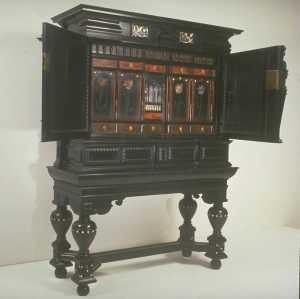
Specifications
| Title | Tulipcabinet |
|---|---|
| Material and technique | Cedarwood, ebony, ivory, mother-of-pearl, quicksilver |
| Object type |
Collector's cabinet
> Cabinet
> Cupboard
> Furniture
> Living
> Utensil
|
| Location | This object is in storage |
| Dimensions |
Width 132 cm Height 183 cm Depth 52 cm |
|---|---|
| Artists |
Furniture maker:
Herman Doomer
|
| Accession number | Div. M 17 a-d (KN&V) |
| Credits | Acquired with the collection of D.G. Van Beuningen, 1958 |
| Department | Applied Arts & Design |
| Acquisition date | 1958 |
| Creation date | in circa 1635-1650 |
| Collector | Collector / D.G. van Beuningen |
| External exhibitions |
Boijmans bij de Buren - REMIX ROTTERDAM, Boijmans X Wereldmuseum (2020) Flowers Forever. Flowers in Art and Culture (2023) |
| Material | |
| Object | |
| Geographical origin | The Netherlands > Western Europe > Europe |
All about the artist
Herman Doomer
Anrath circa 1595 - Amsterdam 1650
Museum Boijmans Van Beuningen owns two cabinets by Herman Doomer. Originally from Germany, Doomer started working as a cabinetmaker in Amsterdam in 1613. He was...
Bekijk het volledige profiel
























